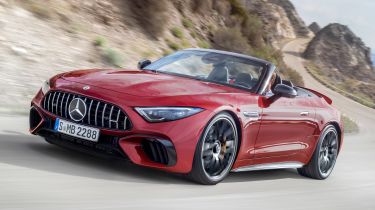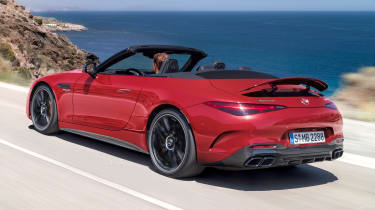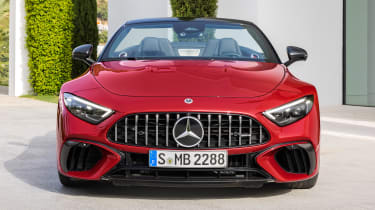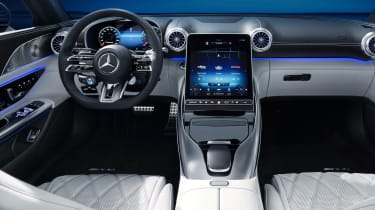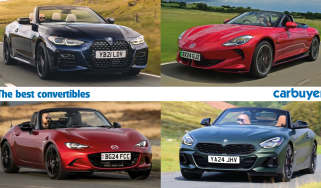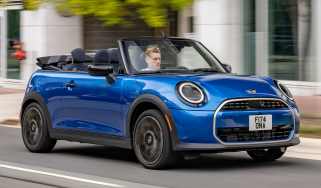New 2022 Mercedes-AMG SL storms in with 577bhp
The next-generation Mercedes-AMG SL has four seats, a fabric roof and upgraded technology
- All-new flagship roadster gets AMG-only model range
- Will launch with V8-powered SL 55 and SL 63 variants
- Features 2+2 seating, a fabric roof and upgraded technology
The new Mercedes-AMG SL roadster has been unveiled. The seventh-generation model represents a dramatic reinvention for the SL, with an all-new design featuring a fabric roof, a 2+2 seating layout (meaning there’s no middle rear seat) and all-new technology, plus four-wheel drive and a hybrid version for the first time in its history.
 The best convertible cars on sale 2025
The best convertible cars on sale 2025
The new SL has been developed by Mercedes’ AMG performance division and uses a new platform and a lighter body. It’ll be available as two V8 petrol models at launch, badged SL 63 4MATIC+ and SL 55 4MATIC+, with a hybrid powered AMG E-Performance model to follow in the future. The brand says the interior of the new car is driver-focused, boasting a digital twin-screen setup shared with the new S-Class and C-Class.
A release date has yet to be confirmed but when the new SL arrives it will effectively replace the now-discontinued Mercedes S-Class Cabriolet. Prices have not been released either but we’d expect them to start at around £85,000. Direct rivals include the BMW 8 Series Convertible and Porsche 911 Convertible.
2022 Mercedes-AMG SL roadster: engines and performance
When the SL is launched, it’ll be available with an AMG developed turbocharged 4.0-litre V8 petrol engine with two power outputs. Mercedes’ 4MATIC four-wheel drive is standard, as is a nine-speed automatic gearbox.
The SL 55 4MATIC+ kicks off the range with a power figure of 469bhp. This model is capable of 0-62mph in 3.9 seconds and a top speed of 183mph. Above this, the range-topping SL 63 4MATIC+ has 577bhp, managing 0-62mph in 3.6 seconds and an improved top speed of 195mph. Officially, both engines return fuel economy of 23.9mpg and CO2 emissions of 268g/km.
The new SL is the first ever four-wheel drive variant in its history, featuring a variable 4MATIC system that can distribute power between the front and rear wheels. The SL 55 gets a steel suspension setup with AMG Ride Control and adaptive damping. The SL 63 is equipped with AMG Active Ride Control, which adds an adjustable suspension setup and hydraulic anti-roll system to improve handling. The flagship model also has a limited-slip rear differential to help the wheels maintain traction when you’re using a lot of the engine’s power. The differential is an option for the SL 55.
Four-wheel steering is standard on both models. It operates at speeds of up to 62mph, turning the rear wheels in the opposite direction by up to 2.5 degrees to help with manoeuvrability at low speeds. Above 62mph, the rear wheels turn in the same direction to improve handling.
An E-Performance hybrid version of the SL has also been confirmed but Mercedes has not revealed any further details of the powertrain that will be used or when this model will go on sale.
Design
For the seventh-generation model, Mercedes has given the SL an entirely new design with a strong AMG influence. The nose of the car is dominated by a wide ‘Panamericana’ radiator grille, giving the front an aggressive look, with sharp vertical bonnet creases, large air intakes and an upswept, slim LED headlight design. A large set of AMG-specific alloy wheels can be specced in sizes ranging from 19- to 21-inches. At the rear, the AMG-influence continues with a signature rectangular quad exhaust system, a diffuser and an electronically deployable spoiler, which houses the uppermost brake-light cluster.
The biggest change for this model, however, is the fabric roof that replaces the metal folding version used for the previous generation. It can be operated at speeds of up to 37mph and can be raised or lowered in around 15 seconds. The switch to a soft top saves a total of 21kg and gives the car a lower centre of gravity.
Mercedes has also given the new SL a variety of active aerodynamic features, which include a pair of what the brand calls ‘AIRPANELS’ located in the front air intakes. These are electronically controlled louvres that control the airflow around the car at speed; they’re generally closed to improve aerodynamics but are automatically opened when the engine requires additional cooling. The car’s rear spoiler also improves stability, automatically deploying at speeds above 50mph to provide additional downforce, with four positions ranging from fully stowed up to a 22-degree angle. The active aero also extends to the front underbody of the car, which helps to channel air to the rear diffuser.
Interior, technology and practicality
Inside, the interior has received a much needed refresh with a sizable digital upgrade. It follows the lead of the latest S-Class and C-Class, with two digital screens dubbed ‘hyperanalogue’. A 12.3-inch digital dial cluster is fitted and is integrated into a visor to prevent reflections when the roof is down.
The main infotainment touchscreen is a 11.9-inch portrait unit mounted in the centre console. It features electrical adjustment, meaning drivers can adjust the angle to avoid glare. This dual-screen setup runs Mercedes’ latest MBUX system, as already seen in the new S-Class, but with AMG-specific features including the Track Pack and Performance settings.
An array of new connectivity features have been added too, including Car-to-X and Live Traffic Information, which allow the car to share and receive real-time traffic information, including warnings of any upcoming hazards on a route.
Other new connectivity features include remote access via the Mercedes me app, with owners able to check if their car is locked or unlocked. The app can also give information on available parking spaces at a destination, including in multi-story car parks. Apple CarPlay and Android Auto also feature, along with what3words navigation functionality. The ‘Hey Mercedes’ voice assistant can also be used to operate the car’s essential functions on the move.
The design of the cabin looks similar to the brand’s recently updated models, with a new three-spoke steering wheel, propeller-style air vents and ambient lighting. The front seats are a new compact design and buyers will be able to pick from a range of trims including two-tone nappa leather or a mix of nappa leather and Dinamica fabric. The new SL also has a 2+2 seating layout, with the two rear seats intended for occasional use.
The switch to a fabric roof has bolstered the new car’s practicality as well, with up to 213 litres of storage available as standard. Buyers can also opt for the Load Compartment package, which increases storage to 240 litres.
As a flagship model, the new SL gets all of Mercedes’ latest safety technology, including driver attention detection, distance assist, steering assist, lane keeping and lane change assist. Blind spot assist also features, which can apply the brakes if it detects a collision is imminent while changing lanes.
Chassis and construction
According to Mercedes, the underpinnings of the new SL is constructed from a mix of aluminium, steel, magnesium and fibre composites to reduce weight, with the bare platform pictured above weighing in at only 270kg.
The platform’s design is entirely new from the ground up, with no parts or elements carried over from current or outgoing models. The body is more rigid than the current AMG GT Roadster model as well, with 50% more rigidity across the width and a 40% improvement across its overall length. Mercedes says the car’s rigidity improvements make it more agile to drive and more precise, with less body lean in corners.
Further improvements have been made to make the new SL better to drive, including a lower centre of gravity. To achieve this, the engine sits lower and closer to the centre of the car.
See where the latest Mercedes S-Class sits on our list of best luxury cars.
Recommended
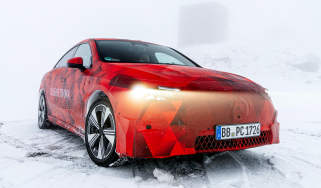
New Mercedes CLA: full details and first ride in Merc’s next-gen EV
Most Popular

Omoda E5 targets rivals: now with zero deposit and APR

Ford Puma Gen-E driven: Electric charmer or too little, too late?
Tips & advice

Car dashboard warning lights: what does each symbol mean?

Electric car charging stations: public networks, charger types, apps and maps


